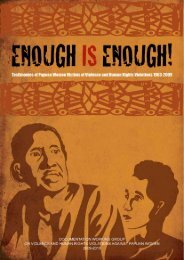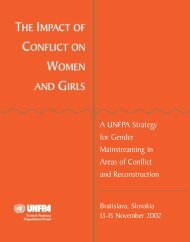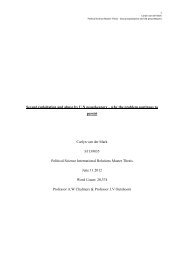IANSA [PDF, 2MB] - PeaceWomen
IANSA [PDF, 2MB] - PeaceWomen
IANSA [PDF, 2MB] - PeaceWomen
Create successful ePaper yourself
Turn your PDF publications into a flip-book with our unique Google optimized e-Paper software.
■ Challenges and Entry Points for Action<br />
Challenges<br />
■ Power struggle and frustration at the<br />
impotence of the Palestinian Security<br />
Force (PSF)<br />
The main challenge facing Palestinian women has<br />
been the complexity of the situation and the<br />
absence of the rule of law in many parts of the<br />
Territory. According to a recent ICG report, 74 cooperation<br />
between Israeli and Palestinians has mainly<br />
meant Palestinian compliance with Israeli rules. The<br />
Palestinian security forces are seen as an,<br />
“Uncomfortable hybrid, simultaneously working in<br />
the national interest to ensure order and on behalf of<br />
a foreign agenda to subjugate armed Palestinian<br />
resistance.” The occupation makes PA law enforcement<br />
very difficult as the Israeli army must approve<br />
all PA movements from one Palestinian city to<br />
another. When the Israeli army conducts an operation<br />
in Area A, the Palestinian police must withdraw<br />
immediately. According to a PA security official, “We<br />
Entry Points for Action<br />
■ Capacity-building for local authorities<br />
and law enforcement<br />
“The first intifada, which was popular and largely nonviolent,<br />
gave us a political process culminating in the Oslo<br />
Accords. The second intifada – in which violence played<br />
a much more prominent role – destroyed everything we<br />
had built. The strategic lesson is clear: confronting Israel<br />
successfully can only be done through unarmed<br />
means.” 78<br />
This quote expresses the view of most of the PA<br />
leadership, who would welcome policy initiatives<br />
to curb armed violence. In June 2011, leading<br />
women’s rights groups including Women’s Centre<br />
for Legal Aid and Counselling, Rural Women<br />
Development Society, Women’s Studies Centre,<br />
and the Palestinian Working Woman Society for<br />
Development organised a workshop with officials<br />
from the PA and the media on small arms and gender,<br />
masculine gun culture, and the impact of gun<br />
violence on women. The Attorney General, Dr<br />
Ahmed Barak, stressed the importance of conducting<br />
a scientific study in this area, offered his<br />
support and welcomed any recommendations that<br />
would come out of such a study. 79<br />
Women’s organisations have reported police<br />
cooperation in sheltering women victims of severe<br />
know well that our officers risk being targeted by the<br />
Israelis if they don’t get out in time”. 75 Over the past<br />
years, the PA has worked hard to prevent attacks on<br />
settlers but repeated settler harassment has gone<br />
unanswered. ICG warns, “Without any prospect of<br />
Palestinian statehood, the PSF will start to look like<br />
collaborators”.<br />
■ Lack of trust in authorities and difficulty<br />
of collecting data<br />
Only a tiny percentage of women suffering physical<br />
violence from spouses seek any form of legal<br />
recourse. Most women instead talk to other family<br />
members or relatives. Women participants in focus<br />
groups also revealed a great reluctance to add to<br />
family tensions. Part of this may be problems of<br />
access to police, or lack of trust in them and the<br />
courts. 76 In a 2005 survey, when asked if participants<br />
or their households possessed weapons, all<br />
the respondents declined to answer. 77<br />
domestic abuse. Women’s groups can therefore<br />
play a role in training Palestinian police and judiciary<br />
for enforcement and investigation, and support<br />
special units for family and child protection in particular.<br />
■ Raising awareness, with youth<br />
in particular<br />
“The only way to have justice is to educate the<br />
people, to educate the youth, teach them it’s not<br />
right to kill and be violent. It’s the only way for us!<br />
In a high school class, last year, I asked 30 youth,<br />
who were 16 years old, “Do you have the right to<br />
beat a woman?” Only one said no. In the West<br />
Bank there are a lot of programs, but in Jerusalem<br />
it’s not the same, especially in the Silwan area.” –<br />
Interview, Silwan and Abu Tor Women’s Centre,<br />
East Jerusalem, May 2011<br />
Many grassroots, community-based women’s<br />
groups expressed a keen interest in working with<br />
youth to raise awareness about violence, so that<br />
young men stop thinking that it’s ok to kill and beat<br />
a woman. (Interviews in East Jerusalem, May<br />
2011) These women are already doing vital work to<br />
protect and support other women and to raise<br />
awareness in their communities against violence,<br />
but they often lack significant resources.<br />
Campaign and awareness-raising support could<br />
target these groups in particular.<br />
5.<br />
Recommendations<br />
1. Strengthen and develop research<br />
and data collection at all levels<br />
Research and data collection on the links between<br />
small arms, gender and violence against women is<br />
the first but extremely fundamental step towards<br />
other activities as interviews show:<br />
• “It would be good to do research and look at the<br />
verdicts in courts: how many murders of women<br />
were by guns? I would say it’s 90%, but I don’t<br />
know.” – Interview, Arab Women’s Organisation,<br />
Amman, March 2011<br />
• “It is important to document these violations in<br />
order to concentrate on the reasons and factors,<br />
why women are subjected to extreme violence.” –<br />
Focus Group Session/Written Communication,<br />
Family Defence Society, Nablus, May 2011<br />
• “The research is not the aim: it’s a tool to know<br />
about the problem. In our work, I think it’s very<br />
important. We all have something here and there,<br />
but we are not in the middle of it. Without the<br />
research we cannot do anything.” – Focus Group<br />
Session, Women’s Centre for Legal Aid and<br />
Counselling, Ramallah, May 2011<br />
• “Data and capacity-building are the most important<br />
- for us, in the same field, to share with other<br />
women.”- Focus Group Session, Rural Women<br />
Development Society, Bethlehem, May 2011<br />
• “I think it is great idea to conduct a regional action<br />
oriented research about the impact/ effect of arm<br />
conflict/small arms on women.” – Focus Group<br />
Session/Written Communication, Women’s<br />
Studies Centre, East Jerusalem, May 2011<br />
Women from all three countries noted the importance<br />
of collecting and consolidating data, as interviews<br />
show. The Women’s Studies Centre at Jordan<br />
University offered to lead a regional comparative<br />
study with the assistance of their Masters’ students.<br />
Palestinian women wrote a concept paper to find<br />
funds to further investigate small arms in OPT, noting,<br />
“This study is important since it can be used as<br />
an aid to the relevant parties in developing policies<br />
and designing appropriate interventions that<br />
address the dangers of possession and use of small<br />
arms, all based on the outcomes and results of the<br />
study.”<br />
A comprehensive study should include questionnaires<br />
for police, lawyers, judges, health professionals,<br />
hotlines/shelters, social workers and address<br />
the following:<br />
• Health care providers: do you note what kinds of<br />
weapons are being used against women whose<br />
injuries you treat?<br />
• Police: Do you respond to calls on domestic violence?<br />
Search homes for the presence of<br />
weapons? Confiscate weapons in cases of<br />
domestic violence?<br />
• Shelters/hotlines: Do you ask if the perpetrator<br />
has threatened the victim with, or has access to,<br />
a gun?<br />
Furthermore, studies should include focus groups<br />
and in-depth interviews to collect age and sex-disaggregated<br />
data on perceptions of guns and security<br />
and an analysis of laws, forensic data (injury and<br />
homicide) and court decisions.<br />
28 29


![IANSA [PDF, 2MB] - PeaceWomen](https://img.yumpu.com/25206379/15/500x640/iansa-pdf-2mb-peacewomen.jpg)

![Commitments Sample [PDF, 93KB] - PeaceWomen](https://img.yumpu.com/25206331/1/190x245/commitments-sample-pdf-93kb-peacewomen.jpg?quality=85)











![A Toolkit for Advocacy and Action [PDF, 260KB] - Peace Women](https://img.yumpu.com/25205989/1/190x245/a-toolkit-for-advocacy-and-action-pdf-260kb-peace-women.jpg?quality=85)